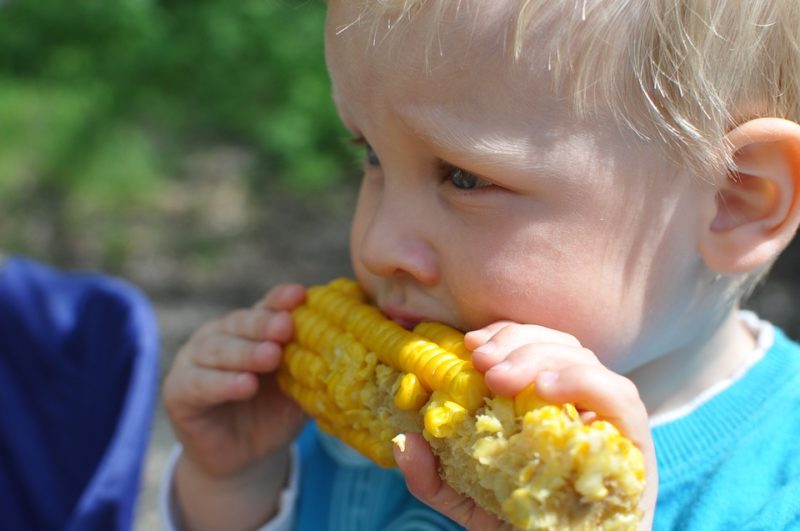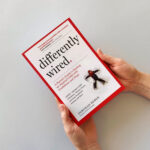According to our calendar, it’s National Eating Healthy Day (it’s also Cookie Monster Day, but we opted for the more responsible option). To encourage you and your kids to observe healthy eating habits year-round, we’ve excerpted a section from Kelly Dorfman’s Cure Your Child with Food on how to think like a (food) detective and pinpoint the dietary culprits that may be making you sick.

To figure out if your child’s problem has a nutritional cause, you have to start thinking like a detective. A great detective has to observe, analyze, and be curious. Rudyard Kipling called this point of view “insatiable curiosity” in his short story about an elephant child. I believe this is the most important characteristic of an effective detective. Ask questions about everything. Talk to other parents about their kids’ habits and health and see how they relate to your child’s. How did they respond to the symptoms? What did they do to intervene? Did they consult an expert beyond their pediatrician? Who was it and what did that person do? What characteristics does this child share with your offspring?
Becoming a good nutrition detective means paying attention to your gut and learning to trust it, as well as drawing on information you may have read or heard. There is no irrelevant learning to a detective: Every detail can play a role in solving the problem or cause behind your child’s illness. Many parents are not aware of how much they know, or think their own “gut feelings” are not important or accurate. Often parents will say, “I read that …” or “I heard that …” Parents pay a lot of attention to what they read when it comes to nutrition and their children, but there has been no single place to connect all the dots and understand how seemingly arcane or unrelated facts apply to our own health situations. Many of the parents with whom I work simply don’t know how to turn their observations and knowledge into usable information to help their children.
Let’s build your confidence by confirming what you might already suspect while filling in with lots of interesting bits of data needed to make the whole puzzle come together. You certainly do not have to remember all the details, but once you know about the possibilities, your thinking will be forever changed. This is how nutrition-detective thinking works.

A recent case shows this step-by-step process in action. I was in Chicago, teaching an all-day course on children’s development and nutrition. The hotel ballroom was packed with interesting people with endless questions. After eight hours, I was cursing the person who had thought up the “all-day” course. Did she have feet? I wondered irritably. As I packed up my computer, one last straggler, a woman in her early thirties, approached me. “May I talk to you for a few minutes?” she asked nervously.
The woman was dressed casually and looked pleasant enough, but I noticed that she was wringing her hands. Before I could say, “Of course,” her story started pouring out. She did not know where to turn. Ever since her baby had been born (eight months earlier) the poor woman had been miserable. At first, she thought her exhaustion was caused by having a new baby and not getting enough sleep, but then the joint pain started. Her doctor discovered she had Lyme disease and prescribed a course of antibiotics, but after weeks of taking them, she didn’t feel any better.
The story continued on and on, and my brain was getting tired trying to follow all of the details. The woman went to see another doctor, who prescribed more antibiotics and more tests, but to no avail—the new mother again did not improve. Her most recent blood test had still been positive for Lyme.
There were probably more important clues in her painful story, but I could barely follow the conversation, let alone sort the details. Many parents are in this exact situation with their own child’s story. They are overwhelmed, exhausted, and emotionally unable to figure out what the situation means. A good parent perseveres, and the least I could do was the same.
The first step when a problem is overwhelming is to strip it down to the bare facts. Removing the emotional components or confusing side stories can help clarify the situation. My fuzzy mind picked out the following basic facts:
- exhaustion
- Lyme disease that is not responding to antibiotics
- joint pain
- new mother
In medicine, there might be ten common conditions with this group of symptoms. Much of early medical training involves learning about large numbers of conditions and their accompanying set of symptoms. Then, when a patient presents with a specific group of complaints, the well-trained physician can identify the ailment. Any group of symptoms will have a small or large group of possible explanations, and the doctor will work through his mental list of possible causes until he more or less matches the patient’s symptoms with a diagnosis. As in all detective work, some of these facts may not be relevant to the primary problem and the critical fact may be missing. In other words, we don’t always know what we don’t know, in which case, even a very good doctor might come to an inaccurate conclusion or diagnosis.
Everyone has suffered and then been blindsided because they did not know enough to consider a piece of information critical. Recently a mother brought her developmentally delayed six-year-old to see me. His language skills were so far behind those of his peers that he could not make friends or be placed in a regular classroom. I outlined a detailed plan for how to support the biochemistry of learning and what she could do that might help him catch up. Toward the end of the session I could see she was becoming very emotional.
“Is everything all right?” I asked with concern. “Are you comfortable with this plan?”
“I am so upset that I did not come and see you when I first got your name two years ago,” she confessed. When asked what stopped her she said, “I just could not imagine how nutrition would help. My doctor said it was probably a waste of time, so I concentrated on other therapies.” How many average mothers know to consider the biochemistry of learning when faced with a developmental delay? Not many. She thought she was doing all she could, and she had been doing all she could with the information she had at the time.





No Comments